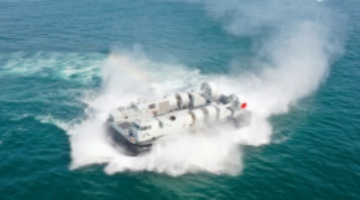By Yan Yu
According to a recent report on the Guardian website, the US Secretary of Defense Lloyd Austin said at the beginning of February that "significant progress" had been made in building a nuclear-powered submarine fleet for Australia as soon as possible.
Reports from the US and Australian media show that UK Prime Minister Rishi Sunak and Australian Prime Minister Anthony Albanese are expected to go to Washington in mid-March to unveil a plan for Australia’s nuclear submarine project with the US President Joe Biden.
The US, the UK and Australia’s decision to conduct and advance nuclear submarine cooperation has drawn growing international concern.
The US is unable to deliver submarines
According to the AUKUS pact signed in September 2021 by the US, the UK and Australia, Australia will become the second ally to acquire the US nuclear-powered submarine technology after the UK. However, over the past year, the cooperation has not proceeded as smooth as expected by the three countries. The Guardian reported that there was growing concern that the US might not be able to provide nuclear-powered submarines to Australia.
According to the Frankfurter Allgemeine Zeitung of Germany, two US senators, Democrat Jack Reed and Republican James Inhofe, have expressed concern about the delivery of nuclear-powered submarines by the US to Australia in a letter to President Biden. They pointed out that this transaction under the framework of the AUKUS submarine deal may impose an excessive burden on the US submarine industry.
It is reported that the US currently has possessed more than 50 nuclear-powered submarines, but the US Navy need 66. The US military personnel once admitted that the relevant US factories have been going all out to build its own Virginia class nuclear-powered attack submarines, and the US has been too busy to provide nuclear-powered submarines to Australia in short term.
Australia may get more harm than good
Although the AUKUS submarine deal is plagued with problems and has been denounced by the international community, the US, the UK and Australia are still determined to promote cooperation on nuclear-powered submarines.
Wei Zongyou, a professor of the Center for American Studies at Fudan University, analyzed and concluded that the US and the UK both have their own calculations. The US is expecting to piece together an "Indo-Pacific version of NATO" in Asia, hoping that its Asia-Pacific allies could take more responsibilities. The UK, on the other hand, attempts to further seek its status as a "global UK" after Brexit with the help of the AUKUS submarine deal while enhancing its presence in the Asia-Pacific region.
In fact, the AUKUS partnership has been widely regarded as a tool to serve the strategic interests of the US since its establishment. This is especially true for Australia, which is actually just tied to the US' chariot more tightly and further reduced to a pawn of the US in the Asia-Pacific region.
At the end of 2022, on the occasion of the first anniversary of the signing of the AUKUS submarine deal, Paul Keating, former Prime Minister of Australia, bluntly pointed out that the small clique built by the US to serve its own Indo-Pacific strategy is not beneficial to Australia. If the Australian government continues to promote the cooperative partnership, "it will be a tragedy for Australia". He believes that the nuclear submarine cooperation is entirely for the benefit of the US and can not meet any military defense need from the Australian side.
It may deal a heavy blow to the Asia-Pacific security order
According to experts, the trilateral security dialogue between the US, the UK and Australia to be held in March may focus on the expansion of AUKUS, the strengthening of military and intelligence cooperation, and the enlargement of military operations in the Asia-Pacific region, as shown by information unleashed from all the three parties.
What the US, the UK and Australia cannot ignore is that the voices against the AUKUS submarine deal have been rising instead of declining both in their own countries and in the international community over the past year or so. All parties are worried about the huge security risks that the deal may bring to the international community.
Yusuf Wanandi, senior fellow and co-founder of the Indonesia Center for Strategic and International Studies (CSIS), said that the US-UK-Australia nuclear submarine cooperation has incurred serious nuclear proliferation risks for the region. Saifuddin Abdullah, Malaysia’s foreign minister, said that Malaysia's negative view of the AUKUS deal remains unchanged and the Malaysian side had attached great importance to peace and security in the ASEAN region.
It is noteworthy that the US, the UK and Australia have said that in addition to strengthening the technical cooperation for nuclear-powered submarines, they would further deepen cooperation in the R&D of hypersonic and anti-hypersonic weapons, and the development of network capabilities, artificial intelligence, quantum technology and submarine capabilities. It is foreseeable that the AUKUS submarine deal is to promote military cooperation at higher levels, and the relevant practices will bring a serious impact on the international security order.
Editor's note: Originally published on paper.people.com.cn, this article is translated from Chinese into English and edited by the China Military Online. The information and opinions in this article do not necessarily reflect the views of eng.chinamil.com.cn.









